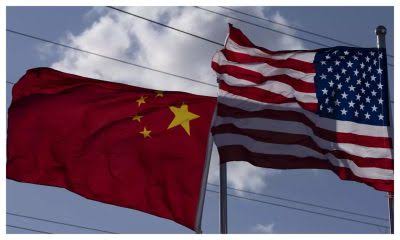News
Partners in Progress: Nigeria-China @54

News
Legacy Honoured in Ede as Leadership Centre Opens in Memory of Isiaka Adeleke+PHOTOS
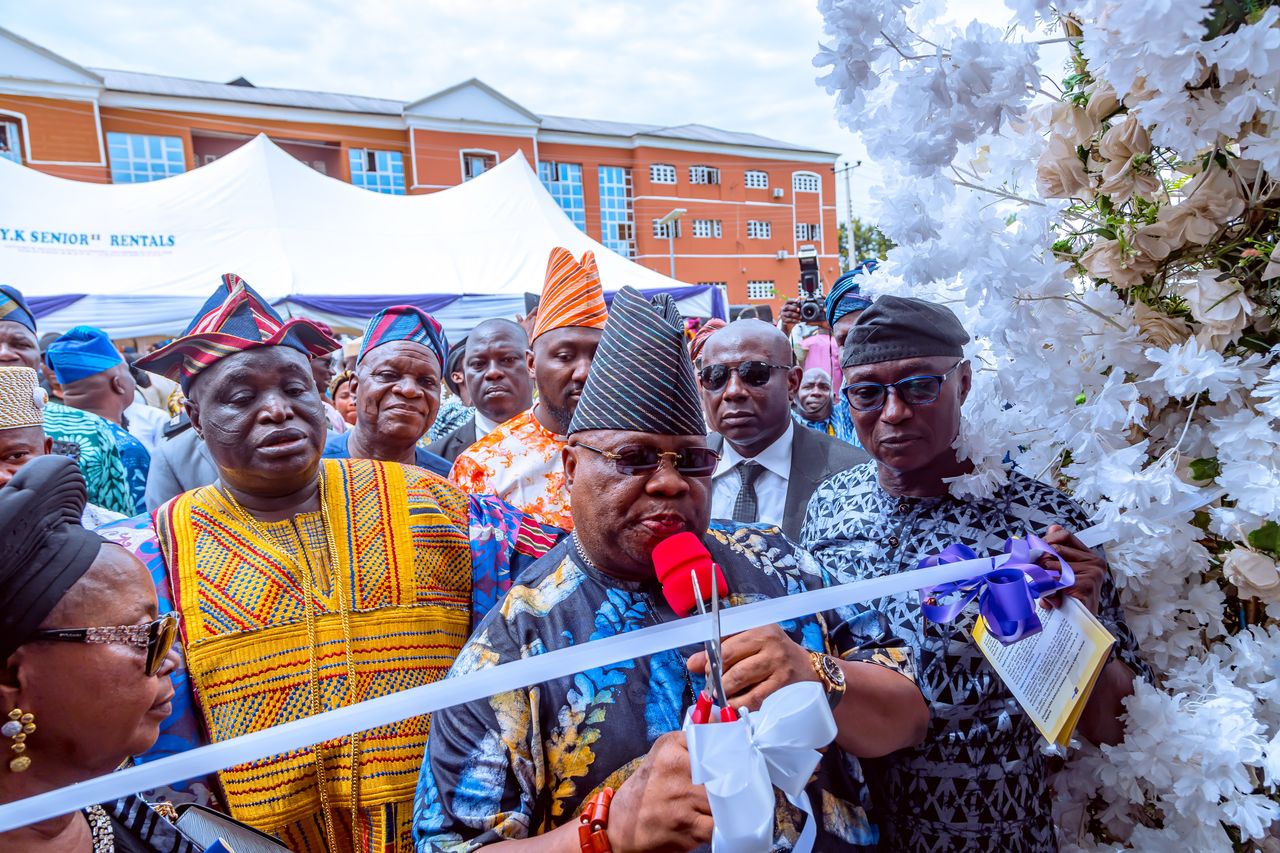
…as Rep Salam say true leadership begins with compassion
By Gloria Ikibah
A quiet air of reverence filled the grounds of Adeleke University in Ede, Osun State, as Governor Ademola Adeleke officially opened a newly completed leadership centre named in honour of his late brother, Senator Isiaka Adetunji Adeleke.
The centre, a project facilitated by member representing Ede North, Ede South, Egbedore, and Ejigbo federal constituency of Osun State in the House of Representatives, Rep. Bamidele Salam, stands as both a memorial and a statement of intent—a space dedicated to raising a new generation of leaders rooted in empathy, integrity, and public service.
Describing the facility as a “landmark initiative” during his address, Governor Adeleke reflected on the values his late brother embodied—values he said continue to inspire governance and community-building across the state.
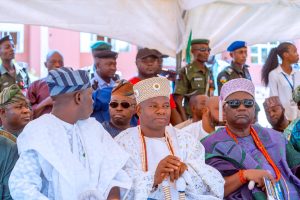
Traditional rulers, community leaders, and dignitaries joined in celebrating the late Isiaka Adeleke, the state’s first civilian governor, with heartfelt tributes that echoed his deep connection to the people and his legacy of accessible leadership.
Rep. Salam, whose vision brought the centre to life, spoke of the late senator’s enduring influence, stating, “Compassion is at the root of true leadership. Senator Adeleke lived this principle, and this centre is a reflection of that truth.”
For many in attendance, the moment marked more than a dedication—it was a reminder of what public service should look like: human, humble, and lasting.
He said, “It is with mixed feelings of joy and remembrance that I attend this event as a special guest. The commissioning of the leadership centre named after my late brother, the first executive governor of Osun State, is a landmark event. The significance is both for the Adeleke dynasty and the people of Osun State.
“My late brother, former Senator and pioneer governor of our dear state, truly represents a school of thought in political leadership. His style, ideas, and philosophy are unique and distinctive. He was a model never before seen in Osun State. He is a leader deeply entrenched in people’s hearts because of his classic, people-centered governance approach.
“When he was alive, my late brother was a leveler who detested discrimination in all forms. His artisan supporters were as important to him as his wealthy admirers. When invited to local events, he wore the clothes selected for the occasion. To him, all men and women are created equal, and differences based on class and wealth were unacceptable.”
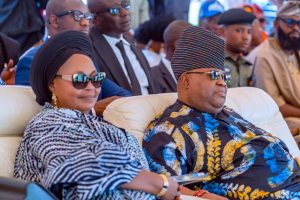
According to the Governor, “If late Senator Adeleke upheld equality in private and public life, he also demonstrated open inclusiveness as a political leader. In both private and public decisions, the late Governor ensured that all stakeholders had a say. He adopted the Athenian model of democracy, where all residents contributed to the governance process.
“Another unique feature was his pro-people outlook. Decisions were made from the viewpoint of the people. I’m u Throughout his tenure as Governor, my late brother focused on delivering democratic dividends and good governance to the people of Osun. He was deeply driven by a love for the citizenry, which he saw as the true goal of democracy.
“Aside from all the above, Senator Adeleke was a strong believer in building a state in infrastructure as a foundation for economic growth and development. He devoted the bulk of his time to creating critical institutions and agencies designed to jumpstart a strong state economy.
“A key ingredient of strong leadership is the ability to inspire followers. Our late Excellency spread optimism amidst governance challenges. His can-do spirit fostered a loyal political following. He mentored many new leaders who continued the spirit of open governance and sustainable development.
“Creating a leadership centre devoted to the first executive governor of Osun State is therefore a well-deserved tribute to a blessed legacy. It is also a legacy project for the present and future generations to learn and embrace a culture of inclusive, consultative, and open leadership.
“I therefore commend the initiator of this project and a mentee of our late brother, Hon. Bamidele Salam. His consistent efforts to sustain the legacy of Senator Isiaka Adeleke are deeply appreciated by the entire Adeleke dynasty and all admirers of our late leader and brother.
“It is my expectation that the centre will run programmes of various dimensions on political leadership. The nation today needs more leaders equipped with skills in open governance, consensus building, public-spiritedness, and selfless public service. The centre under Adeleke University can serve as a valuable platform for imparting those skills.
“It is on this note that I commissioned this centre in memory of the first executive governor of Osun State, the former Asiwaju of Edeland, my dear brother, Senator Isiaka Adetunji Adeleke”, he added.
In an emotionally charged address, Rep. Salam reflected on the eighth anniversary of Senator Adeleke’s passing.
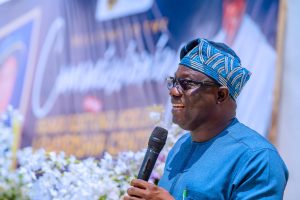
He recalled that it was a quiet Sunday morning, and he was in church at Dada Estate with his friend, Femi Adefila. Midway through the service, Femi suddenly got up and motioned for him to come outside. Confused but concerned, he followed.
Outside, under the shade of a tree, Femi broke the silence. Someone had just called with troubling news—”Gov” was gone. Still trying to process it, he asked, “Which Gov?” But before any answer could settle, the phone started ringing again. One call after another, each one confirming what they’d hoped wasn’t true.
He said: “It was on this day, eight years ago, that Osun State, Nigeria, and humanity lost a truly remarkable man, a great leader, His Excellency, Otunba Isiaka Adetunji Adeleke.
“May God Almighty grant him eternal rest. For a man like Otunba Adeleke, it’s difficult to build monuments worthy of his legacy. No matter how many statues or buildings we erect in his honour, it will never be enough—especially when we think of the countless lives he touched during his time with us.
“Today, as we commission this Leadership Centre, I view it as a small token, a mere drop in the ocean, of the many things that have been, and will continue to be, done in honour of Otunba Isiaka Adetunji Adeleke.
“When we decided to create this Leadership Centre, I thought about what leadership truly means. And at the heart of leadership is compassion.
“I remember a conversation I had with the Speaker of the Osun House of Assembly, Rt. Hon. Adewale Egbedun. He said, ‘You cannot be a political leader if you are not compassionate.’ A person who lacks compassion can never be a good leader. When we think of compassion, we look to the lives of great leaders like Jesus Christ of Nazareth, the Holy Prophet Muhammad, and others who embody this principle. And indeed, Otunba Isiaka Adeleke was one of those leaders who exemplified compassion”.
He went on to explain that the Leadership Centre was built not just as a structure, but as a way to keep memories alive, memories that could easily fade with time.
The lawmaker recalled a conversation from years back with a respected figure in the community, someone who had expressed curiosity about how Governor Isiaka Adeleke found his way into politics. He remembered Dr. Deji Adeleke, their father, once sharing that Otunba Adeleke’s first political aspiration wasn’t a grand one. In fact, he had initially set his sights on something closer to home—he had simply wanted to serve as a local government chairman.
“He approached his father, Senator Ayoola Adeleke, and announced his intention. To his father, this seemed almost laughable—Otunba Adeleke was too refined and too exposed to get involved in such local politics, especially after living for so many years in the United States. But, as time passed, Otunba Adeleke changed his mind and set his sights on running for governor of Oyo State.
“He went to his father again, this time with a bold plan to contest for the governorship, and once again, his father laughed at the idea. But Otunba Adeleke’s determination was unmatched. With unwavering commitment, dedication, and the full support of His Excellency Ademola Adeleke and the rest of his family, he threw himself into the race.
“And as history shows, the political campaign Otunba Adeleke ran in 1989, 1990, and 1991—before the creation of Osun State—was one of the most vibrant and flamboyant in the history of the old Oyo and Osun States.
“That kind of history is not something we can let fade into oblivion. It is something we must preserve. That’s why we are creating this Centre, so future generations can come, press a button, and learn about the journey of Otunba Isiaka Adetunji Adeleke.
“In a time when so much of political history is being lost, we need this Centre to document his life, his work, and his legacy.
“This is a place where younger generations, even 30 years from now, can come and learn who Otunba Isiaka Adetunji Adeleke was and what he stood for.
“Otunba Adeleke was a man of extreme patience and tolerance, qualities that are essential in any great leader.
“The design of this Leadership Centre’s frontage is inspired by the traditional cap of Otunba Isiaka Adetunji Adeleke, and inside, we have a library, a photo gallery, three offices, and a lecture hall that can accommodate up to 250 or 300 people.
“We also have a development plan for the next three to five years to ensure that systems and processes are put in place to sustain the vision and mission of this Leadership Centre.
“Lastly, I want to take a moment to commend the siblings, wife, and children of Otunba Isiaka Adetunji Adeleke. Your support and commitment to his legacy are invaluable,” he added.
Also speaking at the event, the Timi of Edeland, Oba Munirudeen Adesola Lawal (Laminisa I), referred to Otunba Isiaka Adeleke as “an embodiment of wisdom, strength, and leadership.”
He commended Rep. Salam for putting the history together and setting records.
News
West African Ministers Meet in Accra Over Future of Key Regional Institutions
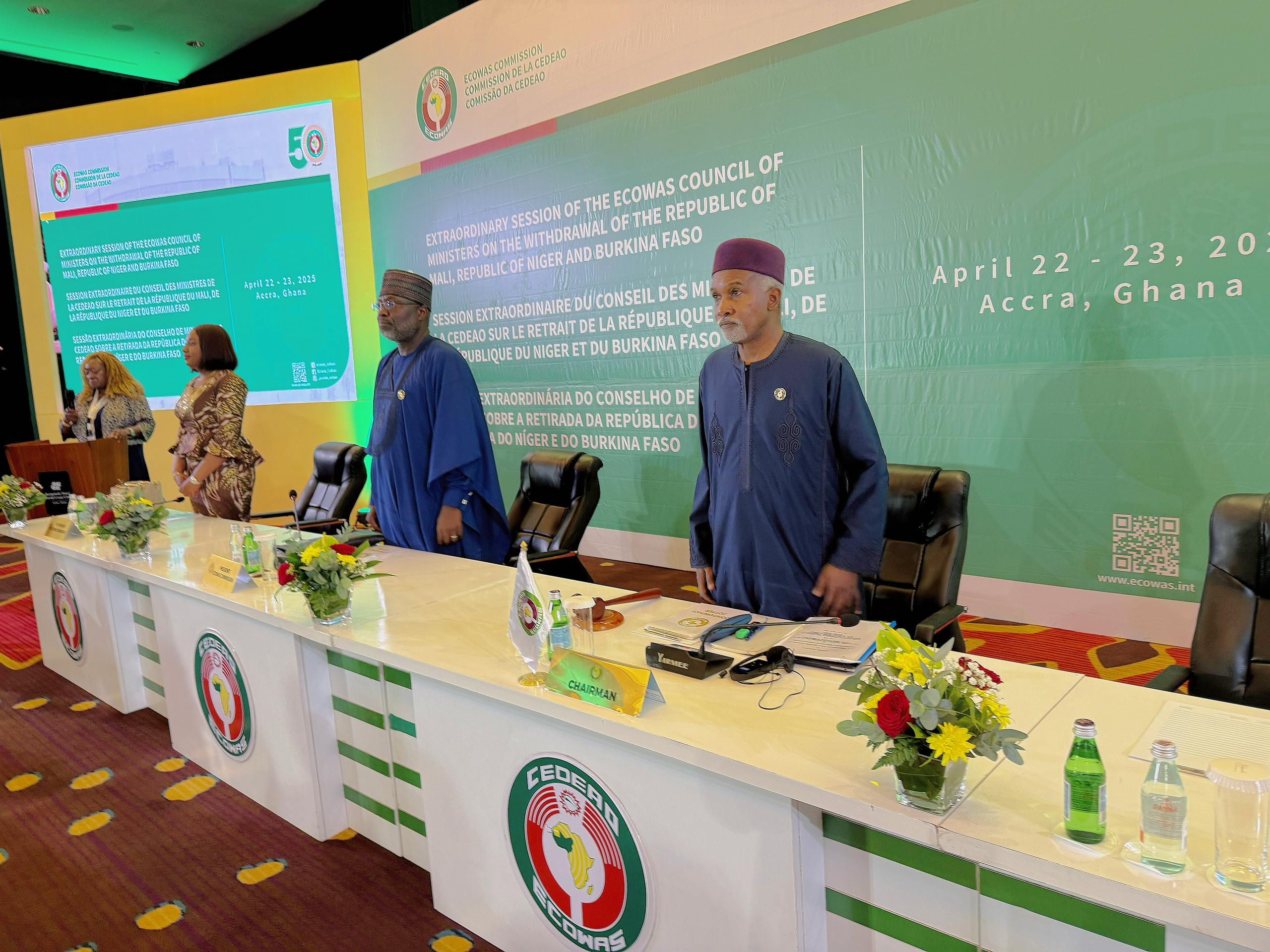
…addresses shifts in bloc dynamics as 3 member states prepare exit
By Gloria Ikibah
Top officials from across West Africa have gathered in Accra for an emergency meeting of the ECOWAS Council of Ministers, as the regional body weighs critical decisions in the wake of formal withdrawal notifications from Burkina Faso, Mali, and Niger.
At the start of deliberations, Nigeria’s Foreign Affairs Minister, Ambassador Yusuf Maitama Tuggar, who currently chairs the Council, acknowledged Ghana’s warm reception and expressed gratitude for the country’s role in hosting the session.
He also praised the joint efforts of Ghana and the ECOWAS Commission in organising the recent “ECOWAS at 50” commemorations, calling the celebrations a timely opportunity to reflect on the journey so far—its shared progress, setbacks, and enduring aspirations.
One of the key items on the agenda was the possible relocation of some ECOWAS institutions, a move that has become necessary as political realities shift and the bloc reassesses its presence in the region.
News
Finally, FG Releases N50bn to ASUU, Varsity Unions for Earned Allowances
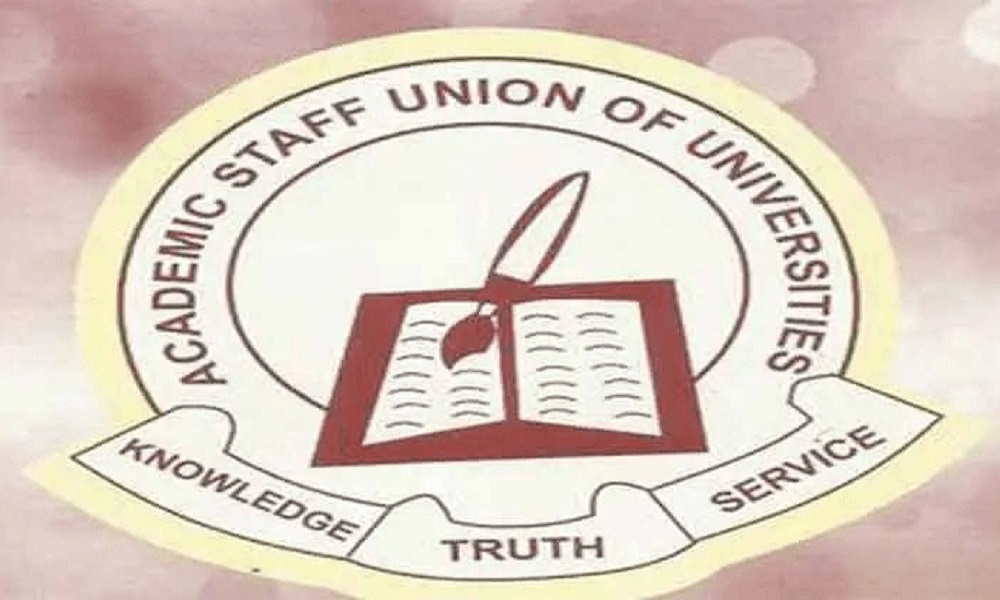
The Federal Government has released N50 billion to settle earned allowances owed to academic and non-academic staff of federal universities, fulfilling a promise by President Bola Tinubu.
Education Minister, Dr. Maruf Alausa, announced the disbursement on Wednesday, describing it as a major step toward transforming Nigeria’s education sector.
“This is not just a financial transaction but a reaffirmation of the President’s commitment to quality education and staff welfare,” Alausa said.
The Education Ministry praised the peaceful atmosphere in federal institutions, noting that Nigeria is currently enjoying one of its longest uninterrupted academic sessions in years.
-
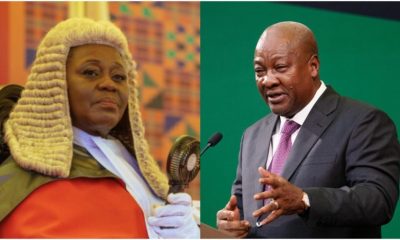
 News23 hours ago
News23 hours agoPresident suspends supreme court chief justice over misconduct
-
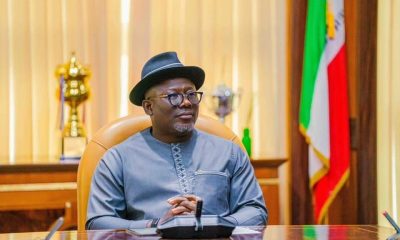
 News13 hours ago
News13 hours agoBREAKING! Gov Oborevwori finally dumps PDP
-

 News23 hours ago
News23 hours agoFinland Grants Extradition of Simon Ekpa to Nigeria on Terrorism Allegations
-
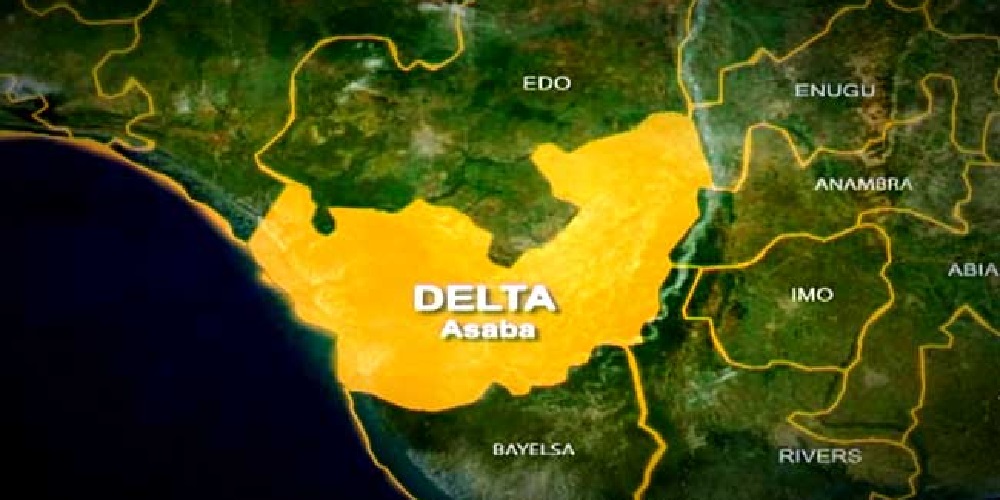
 Metro24 hours ago
Metro24 hours agoFemale Police Officer Assaulted By Lover Of Retired ASP
-
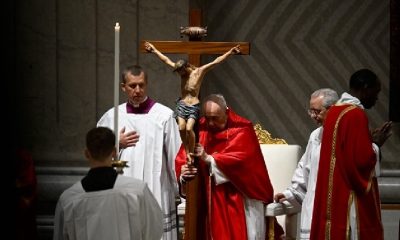
 News16 hours ago
News16 hours ago18 Africans among cardinals to elect new Pope
-

 News15 hours ago
News15 hours agoLagos school owner nabbed for concealing r3pe of eleven girls by teacher
-

 News10 hours ago
News10 hours agoDelta to transform into complete APC state as 25 PDP Local Government Chairmen set to defect
-

 News15 hours ago
News15 hours agoPilgrims Arrive As Lying In State Begins for Pope Francis


